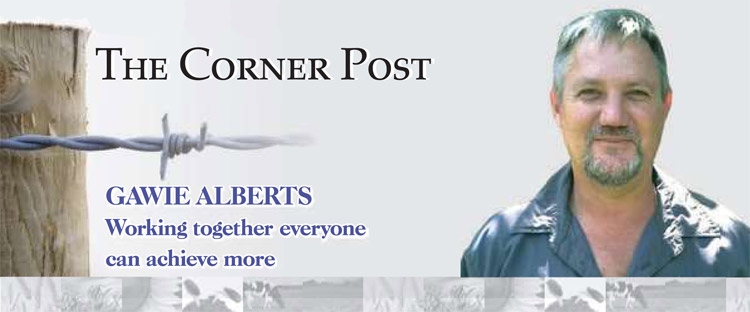April 2017

In this new series, The Corner Post will feature the mentors who form part of the Grain SA mentorship programme. A mentor is that person who gives you advice on how to achieve your own goals and dreams.
Although Gawie Alberts, is not a full-time farmer his love for farming and his knowledge of agricultural practices, combined with his training and linguistic skills (Swati, Ndebele and Sepedi) makes him an excellent addition to the team of mentors who form part of Grain SA’s mentorship programme. He joined the programme during the 2015/2016 season and is looking forward to a long journey of helping subsistence farmers to realise their dreams.
According to Gawie anyone can become a mentor if they have the desire to make a difference in South Africa. ‘I believe a day is wasted if you haven’t made a difference in someone’s life,’ he says. In the current season, he is hoping to make a difference in the lives of 96 subsistence farmers who together cultivate 107 ha of land. He is conveying the importance of correct agricultural practices to these farmers who have been divided into seven groups: A group in Hazyview, one in Barberton, four in the Badplaas area and the latest addition, the Draaikraal group in the Lydenburg area. These groups consist of farmers of all ages and even includes a farmer of over 80.
Teamwork divides the task and multiplies the success
The dictionary explains teamwork as a combined effort of a group of persons working together as a team for a common cause. Gawie learned an important practical farming principal from the new group. In most of the areas which fall under his mentorship, farmers are living in remote areas which makes the feasibility of the study group concept difficult. ‘A lot of valuable training time is wasted on travelling to and from the plots of land to work with farmers on a one-on-one basis,’ he mentions.
The Draaikraal group has the advantage that they have applied the principle of teamwork – individual farmers working together as a group on a communal piece of land. ‘Everyone isn’t trying to survive by just cultivating their own tiny piece of ground, but together these eight people tend to a 8 ha block with great results,’ he shares. ‘The outbreak of the African armyworm didn’t destroy this group’s crop as together they tackled the problem, spraying and defeating the outbreak as a team.’ To Gawie this group shows that small farmers working together as a team, cultivating a bigger piece of land as a unity is the way to go forward to develop subsistence farmers into commercial farmers. This way costs can be shared and better yields can be achieved.
One of the advantages of farming together as a group is that it will make study groups more accessible in the remote areas. Farmers who have not become part of the project can also see the results on the bigger piece of land first-hand. ‘I believe that training should be done in the field. I have found that with the group sessions in a building, interest is easily lost. In the field farmers can see the different growth phases and other agricultural practices and this keeps their attention.’
Gawie says that the economy of scale also does not justify small isolated farming operations. ‘Working together can definitely lower costs and is to the advantage of everyone involved. Farming operations like planting can be done faster and problems can be attended to as a whole, rectified quicker and leads to less damage. Better results are also achieved,’ he explains.
The three things that this mentor sees as pillars on which this viable solution should be built, are trust, respect and support. ‘Farmers must trust each other and realise what the advantages are of working together for this to work. Having respect for each other’s strong points and supporting each other will help them to see that if you cultivate 10 ha as a team, you will manage a cycle quicker and achieve a higher profit than when you work on your own 1 ha, doing all the work yourself,’ he explains.
Chinenye Ogwumike, a Nigerian-American professional basketball player said, ‘True dreams are made when you put aside individual wants for the collective good’. This is the way Gawie sees it. Forget about your ego, work together and change from a small farmer into a commercial one.
The impact of mentorship on the mentor
Mentorship has changed Gawie’s perspective about agriculture. ‘One becomes aware of how hard people are prepared to work with very little resources available to them and how keen they are to improve their circumstances,’ he says. He thoroughly enjoys showing the small farmers the advantages of better agricultural practices.
One of the challenges South Africa faces is getting people to work together. Amongst the many highlights in his short time as mentor are a young couple, a man and wife working together and achieving great success as their focus is on nothing but their produce – maize, tomatoes and sweet potatoes. ‘This young man doesn’t just blindly follow the advice I give, but thinks about what works for his circumstances.’ When they were advised to rip the field, he saw that he could plant in the rip lines. ‘This is why I enjoy being a mentor – it is exciting seeing a farmer’s initiative and his crop was some of the best maize I have seen from my groups’, he shares excitedly.
Article submitted by Jurie Mentz, Development Co-ordinator of the Grain SA Farmer Development Programme, Vryheid. For more information, send an email to louise@infoworks.biz.
Publication: April 2017
Section: Pula/Imvula